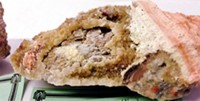Advertisement
Grab your lab coat. Let's get started
Welcome!
Welcome!
Create an account below to get 6 C&EN articles per month, receive newsletters and more - all free.
It seems this is your first time logging in online. Please enter the following information to continue.
As an ACS member you automatically get access to this site. All we need is few more details to create your reading experience.
Not you? Sign in with a different account.
Not you? Sign in with a different account.
ERROR 1
ERROR 1
ERROR 2
ERROR 2
ERROR 2
ERROR 2
ERROR 2
Password and Confirm password must match.
If you have an ACS member number, please enter it here so we can link this account to your membership. (optional)
ERROR 2
ACS values your privacy. By submitting your information, you are gaining access to C&EN and subscribing to our weekly newsletter. We use the information you provide to make your reading experience better, and we will never sell your data to third party members.
Materials
Zeolite filters out carcinogens from smoke flavoring
Besides removing harmful compounds, the filtering process also improves the smoke’s flavor
by Kerri Jansen
March 21, 2018

Infusing foods with smoke can create delicious flavors, but the process also can introduce small amounts of carcinogenic compounds into the food. At the American Chemical Society national meeting in New Orleans on Wednesday, University of Reading’s Jane K. Parker reported that filters made from a microporous aluminosilicate material called a zeolite can reduce the levels of carcinogenic polycyclic aromatic hydrocarbons (PAHs) in smoke by as much as 93% while retaining desirable flavors.
Parker’s team used a naturally occurring type of zeolite called clinoptilolite to filter smoke from oak wood before using it to prepare food. They found that the filter worked best when they activated the zeolite with a heat treatment and ground it into a fine powder to maximize the surface area in contact with the smoke. The zeolite reduced the levels of benzo[a]pyrene, a type of PAH that the International Agency for Research on Cancer classifies as a known human carcinogen, by 93%. Concentrations of several other PAHs also dropped, many by more than 70%, said Parker at a symposium organized by the Division of Agricultural & Food Chemistry.
Removing these compounds had no adverse effect on the smoke flavor, the researchers found. A panel of 12 expert tasters evaluated chicken brined in smoked water and cream cheese mixed with smoked tomato flakes, prepared with either filtered or unfiltered smoke. The tasters described the filtered smoke flavor as more balanced, with fewer bonfire- and diesel-like flavors than foods prepared with unfiltered smoke.
The researchers used mass spectrometry to analyze the compounds in the two types of smoke and found that the zeolite filter primarily removed higher molecular weight components, which Parker said may be the chemicals responsible for the harsher flavors.
Jonathan D. Beauchamp, a food scientist at Fraunhofer Institute for Process Engineering & Packaging, who co-organized the symposium, said he thinks the work could have a broad impact on the food industry, as a zeolite-filtered smoking process could be applied to a wide variety of smoked food products.




Join the conversation
Contact the reporter
Submit a Letter to the Editor for publication
Engage with us on Twitter